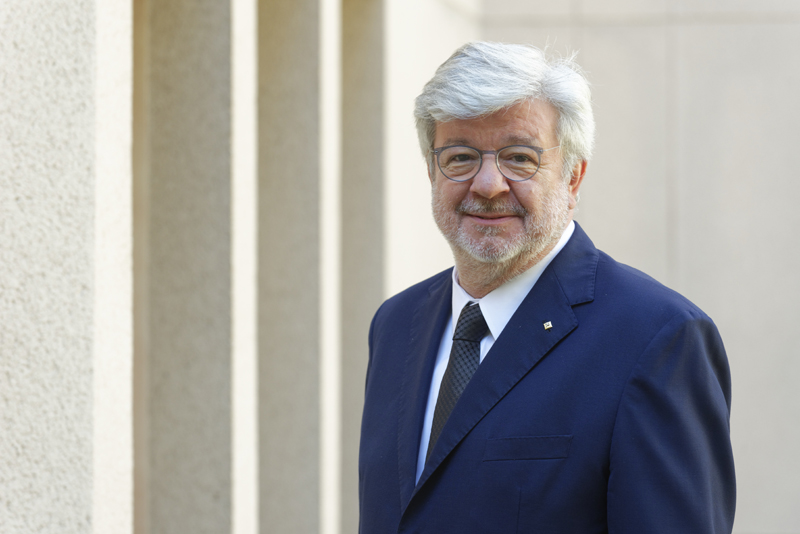The major transformations of the 21st century: “the humanities and social sciences are essential”
New materials, artificial intelligences, green energy, virtual reality, 5G… so many new innovations are impacting our society. The transformations they bring about result in changes to organizations, and redefine the role humans play in their environment, in both the professional and private realms. According to Christian Roux, Executive VP for Research and Innovation at IMT, this aspect must not be overlooked. He defends a systemic, multidisciplinary approach to the digital, productive and environmental transitions that are taking place. Here, he shares his view of the role the humanities and social sciences play in the reflections on these issues, giving us an enticing sneak-peak of the upcoming “Society, Business, Economy: Transformation in Progress” symposium that IMT is organizing on November 3 and 4 to present the latest developments in this area.
You believe that a systemic approach to the transitions caused by new technologies is essential. Why?
Christian Roux: Only a global approach can produce solutions that truly meet needs. A co-development approach that includes all the issues is therefore essential. Involving the humanities and social sciences in questions of technological innovations provides an opportunity for questioning their relevance, which prevents situations in which designers realize too late that a product or service is completely out of step with users’ needs. A very practical example of this is the industry of the future — or industry 4.0 — which is transforming processes through technologies such as augmented reality, which will change operators’ practices, by guiding their movements, for example. If we do not consider the human factor—the people who are the users—there’s a good chance the solution will miss the intended objective. The humanities and social sciences are therefore essential.
Is business a priority research area for IMT in the humanities and social sciences?
ChR: Our key areas are connected to the complex context of the major transformations that are taking place. Because businesses are particularly impacted by these transitions, it is naturally an area of interest. Companies are increasingly beginning to think in terms of networks, outside the walls. This raises the question of new forms of organization and creates heightened tension among the various areas within a company, such as in logistics. A new form also demands more responsible management, with an expected level of performance in this area as well. In general, companies undergo many changes due to the very far-reaching digitization. The concept of value is challenged, and there is a need to understand what it really is. This leads to a redefinition of the components that have traditionally made up a company, such as production, the use of this value, or design.
The question of design is also a major focus of our research. What changes are made to the decisive individual and collective processes involved in the various design phases of a product or service? This is the type of design and innovation question that our researchers are working on. Our interactions with the corporate ecosystem in this area are very valuable, particularly anything related to fab labs, open innovation, etc.
The corporate world is part of the human environment, but digitization also affects the personal sphere. What issues are your researchers exploring from that perspective?
ChR: The ethical aspects of technological innovations are an obvious issue. For example, the issues of the governance of algorithms, for example, is directly linked to questions on artificial intelligences. Humans are also part of new networks of connected objects, but what is their role in these networks? This is the question the Télécom École de Management’s Social Networks and Connected Objects Chair is seeking to answer.
The individual’s position as a consumer is also being redefined. This is the field that has been opened by the reflections on digital labor, in which crowdsourcing platforms are emerging as work methods, such as YouTube. What compensation does the user expect in return in this type of situation?
The issues that you mention involve regulatory aspects. What role can an institute like IMT play in this area?
ChR: Our role is situated upstream of regulations. It involves advising public authorities and informing the debate on regulatory mechanisms. We can offer keys for analysis and understanding. The social sciences are fully integrated in this area, since the issue of regulation involves the concept of social compromise. Once the regulations have been established, we must be able to analyze them, especially for the purpose of studying and explaining the inadequacies. A good example of this is data management, in which a compromise must be found between protecting privacy and creating value. This is the purpose of the Chair on Values and Policies of Personal Information, which brings three of our schools together to focus on this issue, while the Innovation & Regulation Chair at Télécom ParisTech also studies these issues very closely.
How can these skills be integrated into a systemic approach?
ChR: First of all, the chairs that were mentioned above bring together several skills and disciplines, and involve industrial stakeholders who present their problems. We then develop places for experimentation, like the living labs, which are spaces where we can analyze human behaviors in a variety of controlled technological contexts. For IMT, the systematic approach represents, above all, the legacy of the French engineering training method, which is very broad-based from both a technological stand point and from the perspective of the humanities and social sciences, enabling the development of practical solutions to the problems at hand. Over time, this approach has inevitably been applied to the research we are conducting. Some of our schools are now over two hundred years old, and have always maintained a close connection with the corporate world and society.





Leave a Reply
Want to join the discussion?Feel free to contribute!